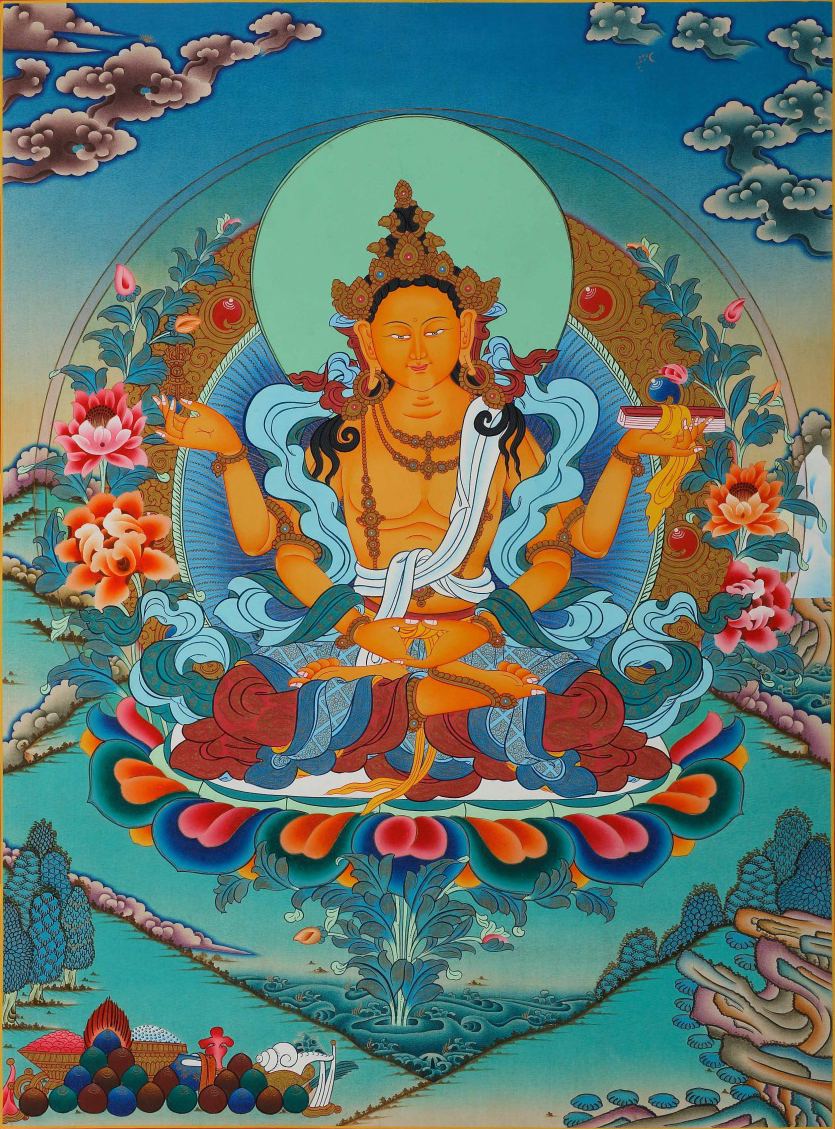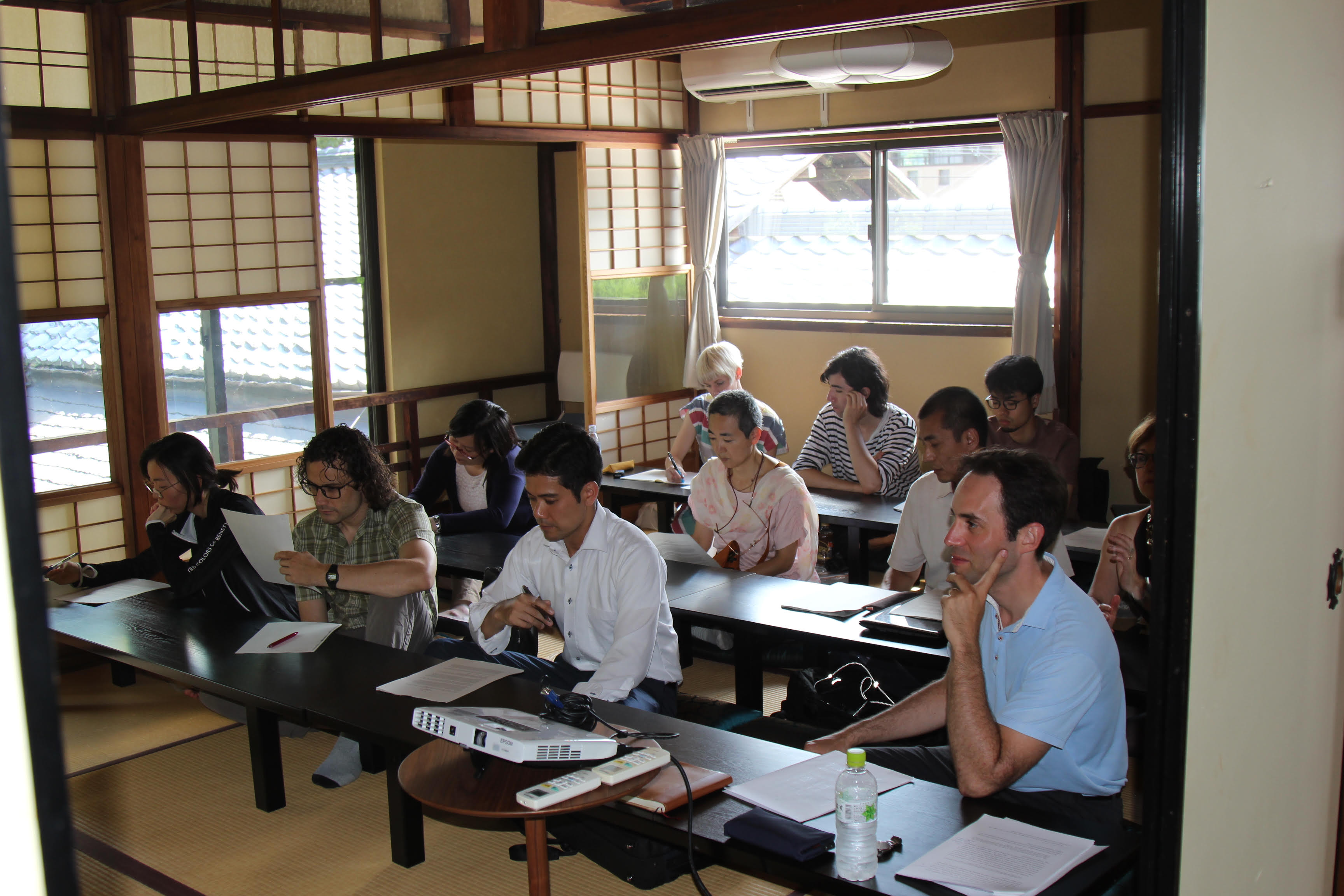Contact: philosophia[at]gsais.kyoto-u.ac.jp


Above left: The Path of Philosophy, Tetsugaku no michi 哲学の道, Kyōto
Above right: Prajñā 般若, i.e. wisdom智慧, as symbolized in a Tibetan Buddhist painting
A Very Short History
The Research Group on Mindful Living emerged from the collaborative work and intention at Kyoto University’s GSAIS/Shishu-Kan to offer a contribution from the standpoint of philosophy and humanities to the transdisciplinary field of “human survivability studies,” in order to alleviate suffering and enhance human flourishing. Created in 2016, and evolving with different denominations (including “Research Group on the Philosophy of Life”), it has taken its current shape in 2020 with a renewed focus on “mindful living.”
“Mindful Living”
By “mindful living” we actually mean philosophical living. Following the works of Pierre Hadot, we understand philosophy as a way of life, and based upon Kyoto University’s special legacy in philosophy and humanities with the so-called Kyōto School, we continue to explore the possibility of a cosmopolitan Buddhist philosophy in dialogue with the West. Our vision is to examine theoretically and practically more thoughtful, meaningful, careful, compassionate, resilient, satisfying, ethical, responsible, viable and sustainable ways of life. Our quest is the search of the “good life” in the 21st century, in order to survive and thrive.
“Mindfulness”: Bridging East & West, Classical Humanities & Modern Sciences
To do so, we focus on the life-skill of “mindfulness,” originally a Buddhist concept (Pāli sati; Sanskrit smṛti; Tibetan dran pa; Chinese nian 念, Japanese nen) meaning the monitoring function of both memory and attention, and in its deepest level a presence of mind characterized with openness, clarity, and compassionate responsiveness regarding moment-to-moment direct experience. Over the last decades, this skill and its training techniques have been researched scientifically, leading to innovative (and thus sometimes questionable) applications in mainstream institutions (healthcare, legal system, education, workplace, etc.) in order to face contemporary challenges, alleviate suffering (stress, anxiety, depression, etc.), and promote human flourishing, “virtues” or character strengths. Our central methodology is to take the standpoint of cross-cultural philosophy or philosophical anthropology in order to elucidate this concept and experience in Eastern and Western deep cultural backgrounds, mutual exchanges and knowledge transfers, as well as to create a bridge for academic dialogue and collaboration between classical humanities (or “ancient wisdom”) and modern sciences, especially psychology and medicine.
The Integrative Model: The Threefold Wisdom of “Learning, Reflection & Practice”
Our epistemological and methodological model is the pan-Asian and Buddhist framework of the “threefold wisdom” (三慧) born from “learning, reflection and practice” (聞・思・修), that is deeply in harmony with the Western conception of philosophia as the synergy of logical discourse and way of life, in love with, and in search of wisdom. Beyond static and binary opposition, it shows a dynamic articulation between the three main sources of knowledge, namely (1) tradition, (2) reason, and (3) intuition or direct experience, each one being surpassed by the next in the process of the re-actualization of wisdom, that is the personal acquisition of self-knowledge or metacognition. The diverse facets of mindfulness, mnemic, reflexive and attentional, can also be integrated as (1) learning and keeping present in mind correct information, (2) forming correct re-presentations that structure our perception of the world, (3) cultivating a direct presence of mind leading to liberating insights. From a modern academic perspective, this model serves also to yoke together (1) traditional and textual sources, (2) philosophical and scientific analysis, and (3) experimental, clinical, or evidence-based research.
For more on this model, see: Mindful wisdom: The path integrating memory, judgment, and attention
Focus on Culture, Higher & Life-Long Education
The process of the re-actualization of wisdom is especially seen as a re-generation, that is an intergenerational transmission, and often in our globalized world, an intercultural transfer that is always context-sensitive. But such re-contextualization is itself none other than the creation or re-creation of cultures understood as patterns and expressions of the “cultivation of life”: forms or ways of life. Our Research Group focuses thus particularly on cultures as the “life-worlds” in which mindfulness practice is to be embodied and embedded, “cultures of attention,” the very fields of mindful living, with a special interest in our own environment, here and now, i.e. Kyōto’s places and people, as living laboratories and networks to envision a possible cosmopolitan renaissance in the 21st century. From this perspective, we are currently researching, conceiving and developing philosophically informed and culturally sensitive mindfulness-based programs specially adapted to higher and life-long education.
Core Members & Current Research Projects
Supervisor
-Marc-Henri Deroche, PhD, Associate Professor, GSAIS, Kyoto University: Main Investigator of the Grant-in-Aid for Young Scientists B from the Japanese Society for the Promotion of Science (JSPS) for the project “Research on ‘Mindfulness’ in Tibetan Buddhism: Philology of rDzogs chen’s Canon, Scholastic Synthesis, and Philosophy of Vigilance” (No. 17K13328) (2017-2020).
PhD Candidates with Co-Supervisors
-Jiahuan He, “Muslim Communities (Ummah) and Ways of Life in China: The Cultivation of Attentiveness in Hui Sufism and its Relations with Other Religious Traditions” (2019-2023) (Co-supervised with Nakanishi Tatsuya, PhD, Associate Professor, Institute for Research in Humanities, Kyoto University)
-Lobsang Gnon Na, “Mindfulness, Meta-awareness, and Ethics in Tibetan Buddhist Philosophy: Tsongkhapa and Yeshe Gyaltsen’s Quest for Regulating The Mind.” (2019-2023) (Co-supervised with Izumi Miyazaki, Professor, PhD, Graduate School of Letters, Department of Buddhist studies, Kyoto University)
-Masaki Nomura, “Lessons from the Japanese Culture/Cultivation of Attention for a Viable Future: A Philosophical Study of Kyōto’s Living Traditions and Masters” (2020-2024)
-Ryotaro Kusumoto, “Self-Knowledge and Cosmopolitanism: Research on Mindfulness-Based Programs and Their Implementation into International Education and Transcultural Contexts” (2019-2023) (Co-supervised with Jeremy Rappleye, PhD, Associate Professor, Graduate School of Education, Education and Human Sciences, Kyoto University)
Main Collaborators
-Michel Bitbol, MD, PhD, Director of Research (Directeur de recherches), French National Center for Scientific Research (CNRS), Ecole Normal Supérieure, Archives Husserl (UMR 8547)
-Michael Chase, PhD, Researcher (Chargé de recherches), French National Center for Scientific Research (CNRS), Centre Jean Pépin (UMR 8230)
-Masakatsu Fujita, PhD, Emeritus Professor, GSAIS, Kyoto University
-Yuki Imoto, PhD, Assistant Professor, Faculty of Science and Technology, Department of Foreign Languages and Liberal Arts, Keio University
-Takafumi Kawakami, Vice Abbot, Shunkōin Temple, Myōshinji, Kyōto
-Antoine Lutz, PhD, Tenured Researcher, INSERM (French Medical Research Institute), Lyon Neuroscience Research Center
-Harold Roth, PhD, Professor of Religious Studies and Director of the Contemplative Studies Initiative at Brown University, USA
-Michael Sheehy, PhD, Director of Scholarship at the Contemplative Sciences Center, Research Assistant Professor in Tibetan Buddhist Studies, Department of Religious Studies, University of Virginia, USA
Events
The regular meeting of the research group is held twice a month during the academic semester.


Special public events or lectures have included:
-Online mini-workshop “Mindfulness East & West: Philosophical Significance, Scientific Research, and Social Applications,” with the participation of Antoine Lutz, PhD, Tenured Researcher, INSERM (French Medical Research Institute), Lyon Neuroscience Research Center, and Mari Iizuka, PhD, Professor, Graduate School of Business, Doshisha University; Director, Doshisha Well-being Research Center, 3rd July, 2020.
-Mini-Workshop, “Celebrating UNESCO’s World Philosophy Day,” 21st November, 2019.
-Guest lecture “SDG Target 4.7: Education for Sustainable Development and Global Citizenship,” by Yoko Mochizuki, PhD, Head of Program, Rethinking Policy, UNESCO, Mahatma Gandhi Institute of Education for Peace and Sustainable Development (MGIEP), 3rd March 2019.
-Mini-Workshop “Mindful Attentiveness in East and West: Philosophical Foundations and Cross-Cultural Discussion,” with the participation of Michael Chase, PhD, Researcher, French National Center for Scientific Research (Centre Jean Pépin), specialist of ancient philosophy (Greek, Latin, Arabic), 26 July 2019.
-Guest lecture “Mindfulness and Self-Regulation: Neural and Psychological Perspectives” by Gaëlle Desbordes, PhD, Neuroscientist at the Massachusetts General Hospital and Instructor (research faculty) at Harvard Medical School, 12th April 2019.
-Mini-workshop “Wisdom for the Good Life: Toward an Integration of Humanities & Clinical Sciences,” 7th December 2018.
-Guest lecture “Values and the Concept of Ikigai or Meaningful Work/Living,” by David Malloy, PhD, Vice President (Research), University of Regina, Canada, 2nd November 2018.
-Participation to the Program Planning Committee of the International Research Institute of the Mind and Life Institute, Myoshinji, Kyoto, on “Contemplative Practice in Context: Culture, History, and Science” (https://www.mindandlife.org/international-research-institutes/japan-2018/), 1-5 September 2018.
-Guest Lecture “Integrating Sciences and Wisdom Traditions: The Mission of the Mind and Life Institute,” by Susan Bauer-Wu, PhD, President of the Mind and Life Institute, 31st August 2018.
-Mini-workshop on “The Philosophical Quest of the Good life” 「生きることと哲学」with the participation of Masakatsu Fujita, specialist of Japanese philosophy and the Kyōto School, 9th July 2018.
-Guest Lectures “Contemplation and the Sciences in Dialogue,“ “Buddhist Meditation, Cognitive Science, and the Emergence of New Ways of Knowing,” by Michael Sheehy, PhD, Director of Programs at the Mind & Life Institute and faculty at the University of Virginia, 5-7 March 2018.
-Mini-workshop “The Question of World Philosophy”「世界哲学の課題――東と西の架橋・越境」, with the participation of Masakatsu Fujita, specialist of Japanese philosophy and the Kyōto School, 28th June 2017.
-Guest Lecture “Meditation and Liberal Arts Education in America: The New Field of Contemplative Studies,” by Harold D. Roth, PhD, Professor of religious studies and Director of the Contemplative Studies Initiative at Brown University, 4th April, 2017.
-Guest Lecture “Mindfulness & Leadership: What Makes an Effective and Resilient Leader?” by Jeremy Hunter, PhD Associate Professor of Practice and Founding Director of the Executive Mind Leadership Institute at the Peter F. Drucker Graduate School of Management, Claremont Graduate University, Los Angeles, 10th January 2017.